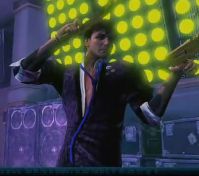Reba did a phone interview in 2007 with a Gay website cvalled GayWired.com:
Exclusive: Up Close with Reba McEntire
Women in Music: Part One of Eight
By Ross von Metzke | Article Date: 9/28/2007 12:03 AM
The idea of doing a series of interviews on women in music struck me for two reasons. First and foremost, it’s the perfect excuse to get on the phone with some of my favorite female artists. But even more important, it’s a chance to bring you, the reader, closer to some music legends the gay press doesn’t often write about.
Case in point, our first woman in music—Billboard Magazine’s first Woman of the Year, Reba McEntire.
When you think gay icons, the mind doesn’t tend to trickle to country music. But Reba has steadily amassed a gay fan base for more than two decades—she’s seen men do drag in her “Fancy” dress, and gay theatre goers showered her with praise when she took over the lead role in Annie Get Your Gun on Broadway. For fans of country, it doesn’t get much better than the queen of modern country music.
Now, as Reba kicks back and enjoys a number one Billboard debut for her just released Duets album—the first of her career, though she’s racked up nine number ones on the country charts—we sat down with the country music legend to take a walk down memory lane. From the making of this album with up-and-coming music heavyweights like Justin Timberlake and Kelly Clarkson to her landmark 1993 single "She Thinks His Name Was John"—the first song in country music to discuss AIDS—this is Reba up close and personal, which is just how she seems to like it.
GayWired.com: Hello.
Reba McEntire: Hello, this is Reba.
GW: Wow, you called in yourself?
RM: Yep, it’s me.
GW: Sorry, you caught me off guard. Usually a publicist calls to connect you to another publicist and then they track down the artist.
RM: Oh, I’ve been doing this a while (laughs). They just let me call.
GW: Well now I like you even more—that made my day.
RM: Well, glad I could help!
GW: Let’s just jump right in to the album. I love it!
RM: Thank you!
GW: An album of duets sounds like such an undertaking. What prompted you to do it?
Reba McEntire: You know, when I was growing up, I was a part of The Singing McEntires with my brother Pake and my sister Susie. My mama has had us singing since we were kids, and then in high school, they formed a cowboy high school band, and it was country music, and we got to get up there on stage and worked. So I’ve always loved singing with people, so when it came around time to do a new album, Narvel [Blackstock, Reba’s husband and manager] said, ‘Why don’t we do a duets album?’ And I thought, ‘Oh, that’s going to be so tough, getting everybody’s schedule together.’ And he said, ‘Yeah, but it’s going to be worth it,’ and my, was he right.
GW: Did you have a long list of people you wanted to work with before you started the project?
RM: I had the wish list. I knew I wanted it to be half country and half pop. So, you know, you call the busiest, most successful people first… with some people, I knew I had to wait until I could find a song, because I knew that was going to be the first thing they were going to ask. Sometimes, you call the person and say you want them to write something. So it all depends.
GW: Is there anyone you wanted to be on the album who you couldn’t get in the studio with?
RM: Annie Lennox and Steve Perry [lead singer of Journey]. I have loved Steven Perry from the very first time I heard him. So I met him and visited with him, and he said, ‘I understand it, but I’m really busy.’ So I said, ‘That’s alright, but I’m going to come around again.’
GW: You’ve become known throughout your career as having a really good ear for great songs.
RM: Thank you very much.
GW: What makes a song right for you?
RM: When the hairs on my arm stand up. When I feel that, I have to sing it.
GW: It that the way it was for you the first time you heard "She Thinks His Name Was John"?
RM: Yes!
GW: That was the first country song to ever openly discuss AIDS. What was it that grabbed you and told you to record it?
RM: I thought, if I could sing that song, other people faced with a similar situation could maybe understand it and deal with it. And it was still so taboo at that time—I didn’t even know anybody who was HIV-positive when I sang it. But I heard it and I thought, “my gosh, what a strong song.”
McEntire performing 'John' in 1994
GW: Did you get much backlash from the country community?
RM: You know, people said to me, ‘Are you sure you want to sing about that?’ And I remember thinking, ‘Why wouldn’t I?' I never thought about it, and actually, I think it’s my responsibility to sing about the hard subjects.
GW: You seem to have built your career on recording and talking about things you’re passionate about. Are you ever worried about what your fan base might think?
RM: No… and I’m not sure that’s always right (laughs). But my fans, they’ve always trusted me, and I’m sure I’ve ticked a few people off. But I find I just have to go with what I believe in my heart is the right thing to do. And my fans are so loyal and so giving. They’ve stuck with me through country, through movies, through Broadway, through TV. I’d be nothing and no one without my fans.
GW: Have you always been aware of your gay fan base?
RM: Yes.
GW: Do you remember the first time you were really aware you had a lot of gay fans?
RM: Oh, I don’t know, but it's been a really long time (laughs). I’m not sure when the first time I became aware of it was, but certainly since the ’80s. A long time.
GW: I’d imagine starring on Broadway, your gay fan base must have quadrupled?
RM: Oh yes, of course (laughs).
GW: What was that experience like, doing Annie Get Your Gun?
RM: Oh I loved it. I absolutely loved it.
GW: Talk about throwing yourself to the wolves, doing Broadway for the first time!
RM: Ross, not only was that my first time on Broadway, that was my first play.
GW: Well you did amazing work.
RM: Thank you! I wanted to play Annie Oakley so badly. And the theatre community is so warm and welcoming. I mean, I loved the play, I loved the theatre, I loved playing Annie, but the people. I loved the people—they’re just a different breed. Theatre people are so passionate about what they do. And with Broadway, once you get in, you’re in.
GW: Would you do it again?
RM: I would love to do Broadway again—if it were the right part and the right script.
GW: I want to talk about a few of your duet partners. There’s obviously been a lot of press around your duet with Kelly Clarkson, but I was equally impressed by your duet with LeAnn Rimes. What’s it like recording with two women so relatively young in the music industry?
RM: I learned from them, they’re both so professional and so talented. With LeAnn, I’ve watched her grow up in this business, and she’s so amazing—I just love her new song “Nothin’ Better to Do”. I remember when she was a little bitty girl wanting to get into this business so badly. She came to our office in Nashville with her mom. Gosh, she sure has come a long way, and she’s become this beautiful, mature, talented, gorgeous woman. So to get in the studio with her was a treat.
GW: And what about Kelly?
RM: Kelly is a hoot. We get along… we’re buddies, we’ve become great friends, and I think that’s because we both understand the demons of the business. We both get the politics and how confusing it is, to have to search your soul so you know what to do sometimes.
GW: With her latest album, the press practically crucified it before anyone even had a chance to hear it. When you see a fellow artist going through sometime like that, what can you say?
RM: You know, with Kelly, I told her, ‘The best advice I can give you is to ask Narvel’. I trust him with all of the business things like that.
GW: Well, and now he’s her manager.
RM: Yes, so I told her to talk to him, and she did (laughs). You know, with something like that, all I can do is say, ‘Keep your chin up, it’ll all get better’. But when it comes to business, that’s not my place. I’m the artist, and an artist thinks differently than a manager. But Narvel’s a very compassionate person, and that means a lot to me.
GW: I’d imagine being in this business as long as you have, with the business constantly shifting and changing, you’re constantly having to change how you approach your work.
RM: Every day the rules change. You know, every day it’s like, ‘Oh, I didn’t know that rule’. It’s kind of like when you’re playing a game and you say, ‘You can’t draw another card out of that stack.’ They’ll say, ‘Oh, is that a Reba rule?’ ‘No, it says so on the box—read the directions’. New rules come up every day. Even when I went away to do Broadway, I had a Greatest Hits album out, but when I came back to music, it was still different. And especially recently that so much technology has come into play. I mean, things like iTunes and Ring Tones—I didn’t have ring tones written into my contract from so many years ago. You have to pay attention and keep changing, keep it fresh.
GW: You also went away to do the TV show. Do you miss it?
RM: Yes.
GW: So you didn’t want it to end.
RM: No, no I didn’t.
GW: You always hear TV is such a great schedule. Were you a 9 to 5er?
RM: I was 9 to 2.
GW: Wow. OK, now that is a dream come true.
RM: Well, Mondays and Tuesdays were longer because you have camera blocking and staging, but yeah, the rest of the week, I was out by 2.
GW: OK, now that’s a job I could handle
RM: (laughs)
Duets is in stores now! For more on Reba McEntire, visit
www.Reba.com.
Be sure to check back next week for part two in our Women in Music series—an up close and personal chat with music legend Chaka Khan. And check back in the coming weeks for interviews with LeAnn Rimes, Annie Lennox, Angie Stone and many, many, many more.










